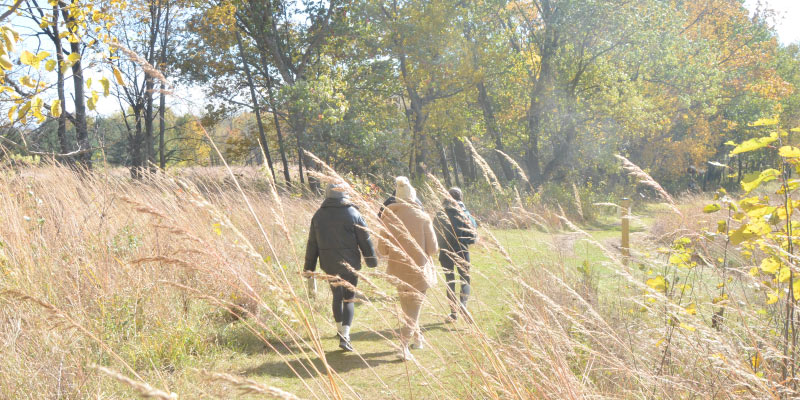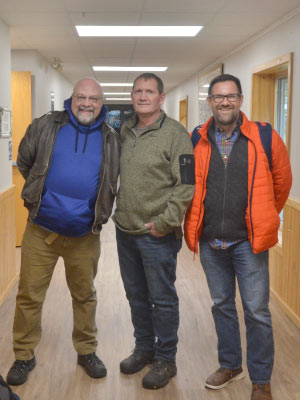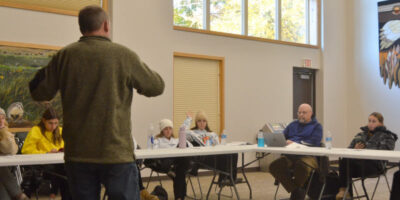
On a brisk October afternoon, a group of University of Wisconsin–Madison students set out on three miles of trails winding through Mosquito Hill Nature Center to fully experience the outdoor community resource in Outagamie County.
They traveled about two hours north of Madison to New London, Wisconsin, to learn more about the nature preserve’s strategic communication needs, which will inform their work through Evjue Centennial Professor Doug McLeod’s Journalism 455: Creative Campaign Messages class. After working on a hypothetical project earlier in the semester, senior Lindsay Pollack said working with Mosquito Hill Nature Center staff heightens the reality of their work.
“Now it’s actually a real client,” Pollack said. “We’re going to be working in bigger groups and we’re going to feel like a mini marketing agency.”

During their day-long visit, the students learned about the history of the nature center, which is part of the Outagamie County Parks System, and existing activities from staff. They toured the indoor educational exhibits in the interpretive building, visited the center’s library, and said hello to the turtles. The nature center’s outdoor activities include hiking and snowshoe trails (both wooded and prairie), observatory for stargazing, and a natural playscape for children.
The students’ time at the center will support the creation of strategic communication materials and a campaign to boost the number of visitors to Mosquito Hill and participation in events that bring in revenue. Mosquito Hill Nature Center naturalist Mike Hibbard said their work is appreciated and will enhance programming and marketing efforts.
“Not only can we learn from working with Outagamie County, but maybe some of our ideas can be picked up by them to make a difference in what they do.” — Doug McLeod
In a question-and-answer session with the students, Hibbard outlined issues to address at the center that include drawing more families to Mosquito Hill, developing new programming, and encouraging visitors to participate in events that raise revenue like Honey Sunday and the Harvest Moon Festival.
“Even though marketing is a priority, the day-to-day limits what we can do on that,” Hibbard said. “This helps us tremendously.”
Mosquito Hill Nature Center is working with the UW–Madison students through a partnership with UniverCity Year (UCY), which is the hallmark program of UniverCity Alliance. From 2021–24, Outagamie County is working with UCY on projects that aim to build a more resilient community, expand opportunity for all residents, and optimize county operations.
In addition to McLeod’s journalism class, three students pursuing a master’s degree in business administration from the Wisconsin School of Business (WSB) are working with Mosquito Hill Nature Center staff to create a sustainable business plan to enhance programs and boost program participation.
“It’s one thing to talk about an interdisciplinary partnership, but it’s another thing to see the students in different classes off campus interacting with our community partners and each other,” UniverCity Alliance managing director Gavin Luter said. “Visiting Mosquito Hill Nature Center made the project come to life for the students! It also allowed them to learn from our community partners, and from each other, which will result in a stronger deliverable.”

Sarah Scheffler, Heather VanderWielen, and Krista Lauring all chose this project in their business consulting class because of their shared love of the outdoors and desire to work with a local community organization. They are conducting a survey to learn more about who currently visits the nature center and what brings them there.
“It feels like you can really make a difference in the community,” VanderWielen said. “I like the outdoors, and I also used to work in nonprofits, so it’s fun for me to come back to those roots and help out.”
Echoing Pollack, Lauring said partnering with a community organization rather than working with a fabricated situation creates a more meaningful learning experience because they are solving actual problems with real groups.
The two classes will also be working together later in the semester. Student groups in McLeod’s journalism class operate like creative agencies, and they will work with the WSB students as consultants. This mirrors another real world connection.
“It creates this working relationship you might see out in the professional world where research strategy consultants work with people who are specialists in creating messages that are an effective part of strategic communication campaigns,” McLeod said.
As an instructor, McLeod values the ability to take his students outside of the classroom and campus. “In the classroom, we can give them hypothetical clients. We can give them hypothetical scenarios. We can do all the research, but they don’t actually get to get real feedback,” McLeod said. “They don’t operate under the pressure of having a real client with real needs look at their work and give them real feedback.”
In addition to these learning outcomes, the partnership with Outagamie County can foster two-way knowledge sharing. “Not only can we learn from working with Outagamie County,” McLeod said, “but maybe some of our ideas can be picked up by them to make a difference in what they do.”